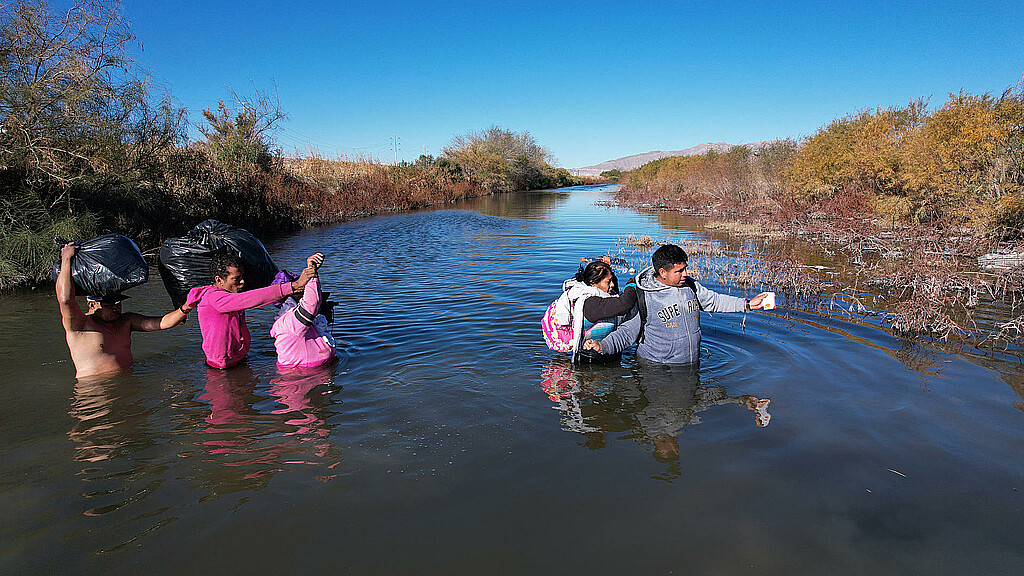Human Rights
DOJ Supreme Court filing reveals details inconsistent with DHS narrative that blames Texas for migrant drownings
DHS accused Texan troops of prevented the CBP from engaging in rescue operations, but the DOJ filing offers new facts about the timing of key events, which suggest the tragic drownings occurred an hour before CBP was event notified about the incident by Mexican officials

January 17, 2024 9:10am
Updated: January 17, 2024 11:38am
A new filing at the Supreme Court by the Justice Department raises new questions that could help exonerate the Texas Military Department after DHS accused the state agency of enabling the deaths of three migrants who drowned at Shelby Park last week.
The White House and Biden Department of Homeland Security both shifted blame to state officials after three migrants, including two children, tragically drowned in the Shelby Park area.
DHS accused Texan troops of preventing CBP officers from engaging in rescue operations, but the DOJ filing offers new facts about the timing of key events, suggesting that the tragic drownings occurred an hour before CBP was event notified about the incident by Mexican officials.
Texas took control of Shelby Park after Austin accused U.S. officials of failing to secure the border there, and the Biden administration has since accused the Texas Military Department of obstructing access to Border Patrol agents.
Washington and Austin exchanged jabs for several days over Gov. Greg Abbott’s decision to secure the area, arguing that Texas was violating the preemption doctrine, which prohibits states from superseding decisions reserved to the federal government—legal areas such as immigration.
That debate quickly evolved into blame shifting after the Shelby Park drowning, with federal officials accusing Texas of obstructing Border Patrol officers from doing their jobs.
They said CBP was barred from saving the drowning migrants even after they were alerted about the incident by Mexican officials.
"On Friday night, a woman and two children drowned near Eagle Pass, and Texas officials blocked U.S. Border Patrol from attempting to provide emergency assistance. While we continue to gather facts about the circumstances of these tragic deaths, one thing is clear: Governor Abbott’s political stunts are cruel, inhumane, and dangerous. U.S. Border Patrol must have access to the border to enforce our laws," the White House originally said in a statement released Saturday night.
The Dept. of Homeland Security also took aim at Lone Star state officials.
“Tragically, a woman and two children drowned last night in the Shelby Park area of Eagle Pass, which was commandeered by the State of Texas earlier this week,” DHS said in a Saturday evening statement. “In responding to a distress call from the Mexican government, Border Patrol agents were physically barred by Texas officials from entering the area.”
The DHS statement also blasted Texas Gov. Greg Abbott for violating the preemption doctrine, and called the Lone state governor “cruel, dangerous, and inhumane,” insisting that “Texas’s blatant disregard for federal authority over immigration poses grave risks."
The Department of Homeland Security also admonished Texan officials, accusing them of unconstitutionally violating the Constitution in their occupation of Shelby Park.
“Texas's actions are clearly unconstitutional and are actively disrupting the federal government's operations,” DHS General Counsel Jonathan Meyer wrote to Texas Attorney General Ken Paxton.
“We demand that Texas cease and desist its efforts to block Border Patrol's access in and around the Shelby Park area and remove all barriers to access in the Shelby Park area.”
While the issue of legality remains at issue, the new Justice Department filing reveals details that contradict the DHS narrative. It suggests that the migrants may have faced their tragic end an hour before Mexican officials advised CBP as to what was happening.
According to the DOJ Supreme Court filing, Mexican officials informed the U.S. Border Patrol about the incident at 9 p.m. local time, an hour after the three migrants drowned at 8 p.m.
The confusion may have arisen from the fact there were still two other migrants “in distress” on the Texan side of the border at 9 p.m. who were suffering from hypothermia.
Fortunately, those migrants were saved by Mexican officers.
The filing echoes the White House’s claim that the U.S. Border Patrol was not prohibited from entering the area “even in emergency situations, and Justice Dept. lawyers assert that the American agency may have been able to spot those migrants if they had access.
“At the very least, however, Border Patrol would have had the opportunity to take any available steps to fulfill its responsibilities and assist its counterparts in the Mexican government with undertaking the rescue mission. Texas made that impossible,” the Justice Department wrote.
Texan lawyers reject that claim, saying that the Lone Star state has never denied the United States the opportunity to rescue migrants in danger or life-threatening situations.
“Claims that [the Texas Military Department] prevented Border Patrol from saving the lives of drowning migrants are wholly inaccurate. At the time that Border Patrol requested access, the drownings had occurred, Mexican authorities were recovering the bodies, and Border Patrol expressed these facts to the TMD personnel on site,” Austin officials said in a statement.
For their part, the Texas Military Department has also denied the DHS allegations, saying they were in “direct communication” with the Border Patrol on Jan. 12, and that when CBP arrived, Mexican officials had already saved the other two migrants.
“Border Patrol specifically requested access to the park to secure two additional migrants that were presumed to have traveled with the deceased, though had crossed to the boat ramp,” the statement says.
“Two migrants were apprehended by TMD, with one turned over to DPS and the other transferred to EMS in response to initial hypothermic conditions. Additionally, TMD remained engaged with lights, night vision goggles, and thermals to ensure that no additional migrants were in the river or in distress.”
Gov. Abbott also chimed in to criticize the narrative, blaming Washington and some media outlets for being “so eager to point [the] finger at Texas for [the] drowning of migrants, they forgot to get the facts.”
“When [the U.S. Border Patrol] requested access to [the] river, the drownings had already occurred & found in [Mexico]," he wrote.
"The fact is the deaths are [because] of Biden's Open Border magnet."
ADN reported on Jan. 12 that armed national guardsmen took control of the Shelby Park area last week as a result of the massive influx of illegal border crossings there.
“The Texas National Guard has maintained a presence with security points and temporary barrier in Shelby Park since 2021. The current posture is to prepare for future illegal immigrant surges and to restrict access to organizations that perpetuate illegal immigrant crossings in the park and greater Eagle Pass area,” the Texas Military Department told Fox News.
That same day, the City of Eagle Pass reported that Texan state officials took control of the Shelby Park area, which lies adjacent to the Rio Grande river, the waterway that divides the U.S. from Mexico.
“Texas will continue to deploy Texas National Guard soldiers, DPS troopers, and more barriers, utilizing every tool and strategy to respond to President Biden’s ongoing border crisis,” Texas spokeswoman Renae Eze told the New York Post.
Abbott has been criticized by liberals and celebrated by conservatives for making innovative and unilateral moves near the border.
In December, the Lone Star state made unlawful entry a punishable crime, empowering law enforcement officers to arrest illegal border crossers while giving judges the right to issue an order for the deportation.
Abbott’s unilateral moves have raised concerns from legal hawks who argue that any state lacks the power to supersede the federal government in the area of immigration under the preemption doctrine.
Last year, ADN reported that Texas entered into a dispute with the United States after it created a floating barrier in the Rio Grande river.








